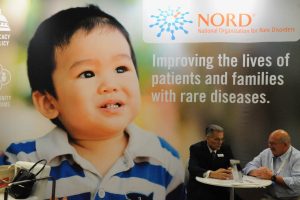Children’s National, NORD Partner to Create Rare Disease ‘Centers of Excellence’

Lobby of Children’s National Health System in Washington, D.C. (Photo courtesy CNHS)
Children’s National Health System no longer treats just kids. Its Rare Disease Institute, launched in April 2017, has partnered with the National Organization for Rare Disorders (NORD) to become the first of many U.S. “centers of excellence” to look after patients with rare diseases, regardless of age.
The effort is modeled on that of the Cystic Fibrosis Foundation in establishing CF centers of excellence to improve patient care.
“Given the increasing survival rates of patients with rare diseases and our enhanced ability to diagnose them, the handful of patients we started with has become an entire population,” Marshall Summar, the institute’s director, said in an interview with BioNews Services.
“In the 1980s, someone born with Down syndrome survived an average 20 years; now it’s in the 50s. Survival for cystic fibrosis in the 1980s was in the teens, now it’s 30 to 40 years,” said Summar, chief of genetics and metabolism at Children’s National as well as NORD’s chairman of the board. “As we bring in new therapies and diagnose better, we’ve increased the cohort of genetic-based patients.”
Summar, interviewed on the sidelines of NORD’s Oct. 16-17 Rare Summit in Washington, said that in some ways, the concept of such an institute goes back to where medical genetics started.
“Now it’s spread across the entire medical spectrum,” he explained. “We have created this group of patients who need chronic care and who use rare disease therapies. We have patients in their 70s, 80s, and even 90s as well as newborns — and some who haven’t even been born yet.”
The Rare Disease Institute currently operates out of Children’s National itself, though it recently acquired 12 acres of land at the former Walter Reed Army Medical Center along Georgia Avenue in northwest Washington. The property, which was vacated in 2011, includes the Armed Forces Institute of Pathology building, a large parking lot, and a 300-seat lecture hall.
Summar said he expects to be operating at the new location by fall 2018.
“This is a 50-year-old-plus building, and we want to renovate it,” he said, estimating that Children’s National will invest “several hundred million dollars” into the project.
At its core, he said, are 14 physicians — all clinical geneticists — as well as 15 genetic counselors, two biochemical nutritionists and four clinical care coordinators. The Rare Disease Institute already treats an estimated 8,000 patients a year. According to a Children’s National press release, the testing and development of new therapies will be a key institute focus.
“The geneticists at Children’s National will use systematic data models that track patient outcomes and treatment regimens to create an ever-expanding clinical knowledge base,” it said. “The institute also intends to eliminate patient care gaps by providing training specific to rare diseases for clinicians, genetic counselors, nurses, researchers and allied health professionals.”
Earlier this year, NORD designated Children’s National as its first “center of excellence” as well as the coordinating center — under NORD oversight — of what will become a three-tier system consisting of eight such full-service centers throughout the United States. At the next level will be “associate centers” that are in geographically important locations. These will have very strict criteria for acceptance, said Summar.
The third-tier level will consist of “topic centers” that focus on a specific rare illness, such as mitochondrial disease.
“We’re now stealing a page from the Cystic Fibrosis Foundation,” Summar told us. “One of the things they’ve done successfully is build a center of excellence. And if you look at the improvement in CF outcomes, a lot of that dates from the time they started the center of excellence. They share outcomes and how the patients are doing.”
Summar, a Tennessee native, spent 25 years at Nashville’s Vanderbilt University, where his research focused on biochemical disorders, as well as the use of registries and natural history studies. He came to Children’s National in 2010 and soon got involved with NORD to help the organization build its registry program.
NORD currently runs 17 disease-specific registries, and the Rare Disease Institute has more than 20 open clinical trials underway.
“Children’s National is a leading medical provider for children battling rare diseases and we are pleased to designate them as NORD’s first Center of Excellence,” Peter L. Saltonstall, NORD president and CEO, said in a January 2017 press release. “This marks a major step forward in establishing rare diseases as a clinical field of medicine, which helps our goal to accelerate research and the development of new treatments to help patients.”
Any disease that affects fewer than 200,000 people in the U.S. is considered rare, according to the National Institutes of Health. That means 10 percent of Americans have one of 7,000 or so known rare diseases (roughly 80 percent of them genetically based). But Summar said that definition is outdated.
Based on the current U.S. population of 326 million, this translates into a rare disease incidence of about 1 in 1,600. By European standards, a rare disease is anything that affects fewer than one in 2,000 people, Summar said, adding that “I think it’s time to go to a per-capita basis as opposed to a flat number.”









Leave a comment
Fill in the required fields to post. Your email address will not be published.